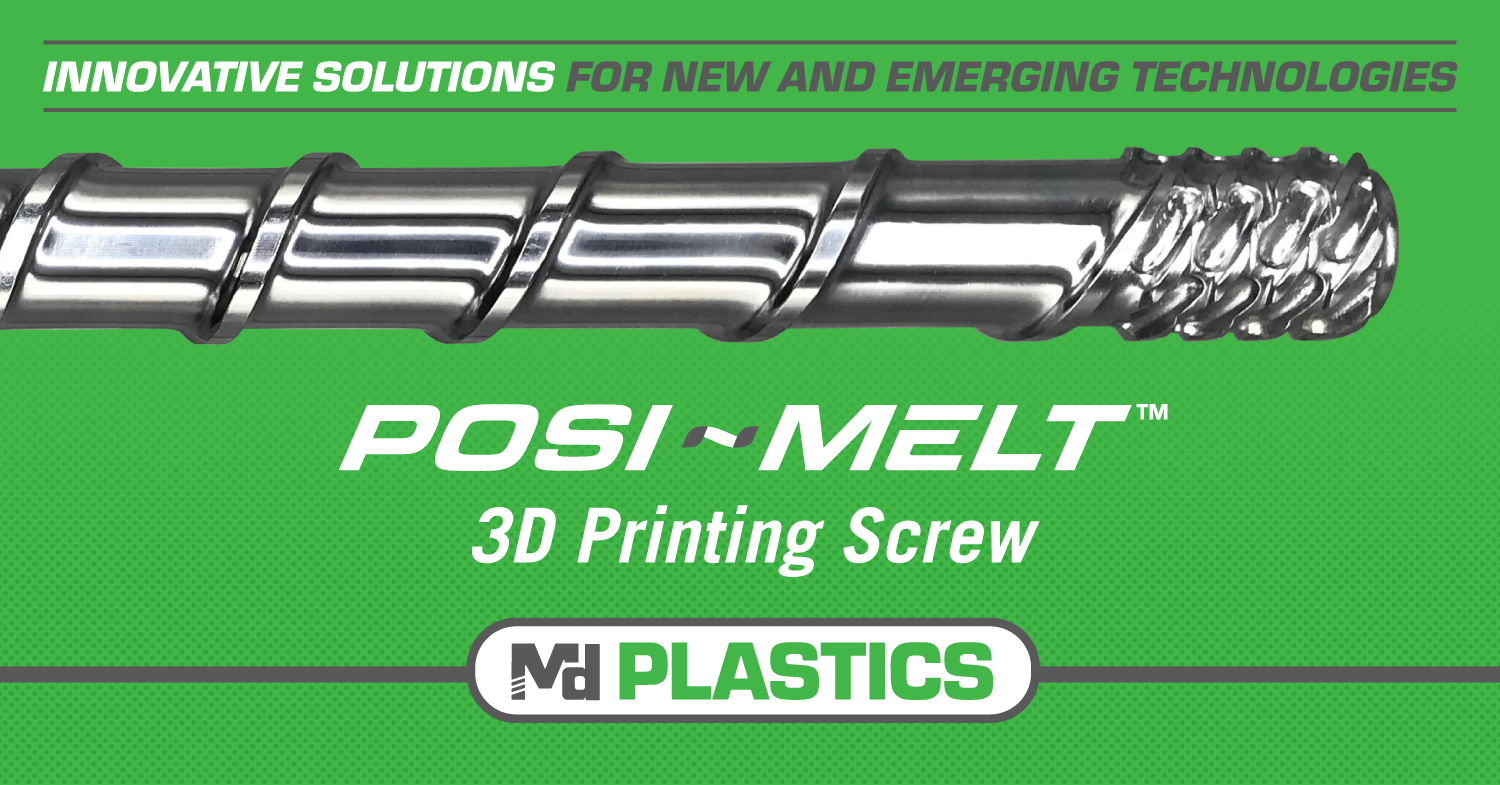In the fast-paced world of plastics processing, the screw is often seen as “just another machine component.” But anyone who has ever wrestled with melt consistency, cycle times, or quality challenges knows that the screw is much more than that—it’s the heart of the process. And when the materials being processed are complex, such as high-temperature engineering resins or newer bio-based polymers, the design of that screw becomes even more critical.
At Md Plastics, we understand that no two applications are alike. The needs of a medical device manufacturer molding polyetheretherketone (PEEK) are entirely different from a consumer packaging company working with polylactic acid (PLA). That’s why we take a personalized approach as a custom screw manufacturer, designing screws that not only address today’s challenges but also prepare processors for the future of advanced and sustainable materials.
In this blog, we’ll explore why screw design is so important for these specialized polymers, what factors influence performance, and how custom solutions can make the difference between wasted production hours and consistent, profitable output.
Why High-Temperature and Bio-Based Polymers Need Special Attention
Plastics aren’t created equal. Commodity resins like polyethylene or polypropylene process relatively easily. But when you move into high-temperature engineering plastics or environmentally friendly bio-based polymers, the stakes rise significantly.
- High-Temperature Polymers: Materials like PEEK, PEI, PPS, and LCPs require extreme processing conditions. They need higher melt temperatures, tighter residence time control, and precise mixing to avoid degradation.
- Bio-Based Polymers: PLA, PHA, and other bioplastics are more heat-sensitive and prone to hydrolysis. They demand screws that provide gentle melting and careful shear management to preserve molecular weight and final part strength.
Off-the-shelf screws often fall short because they’re designed for general-purpose applications, not the nuanced requirements of specialty materials.
The Role of Screw Design in Polymer Processing
Every extruder or injection molding machine relies on its screw to do three things effectively:
- Feed and Convey: Move raw pellets from hopper to barrel.
- Melt and Mix: Generate the right amount of shear and heat to create a homogeneous melt.
- Pump and Meter: Deliver molten plastic consistently at the correct pressure and volume.
When the screw’s geometry isn’t optimized for the polymer in use, problems follow: poor melt quality, increased scrap rates, energy inefficiency, or even catastrophic material degradation. That’s where a custom screw manufacturer steps in—designing screws tailored for both the polymer and the end product.
Key Challenges of High-Temperature Polymers
1. Extreme Processing Temperatures
Materials like PEEK require melt temperatures above 700°F. The screw must be made of materials and coatings that resist thermal fatigue and wear.
2. High Viscosity
These resins don’t flow as easily as commodity plastics. Screws must deliver sufficient shear to melt the resin without over-stressing the polymer chains.
3. Narrow Processing Windows
Engineering resins can degrade quickly if exposed to excessive heat or shear. Screw design must balance mixing with controlled residence time.
4. Abrasive Additives
Many high-temperature polymers are reinforced with glass or carbon fibers. These fillers are highly abrasive, wearing down conventional screws rapidly.
Key Challenges of Bio-Based Polymers
1. Thermal Sensitivity
PLA and similar materials degrade if overheated. Gentle shear and precise temperature control are essential.
2. Moisture Sensitivity
These polymers hydrolyze in the presence of water. A screw design that promotes even melting without prolonged residence helps minimize exposure.
3. Viscosity Variability
Because biopolymers often come from renewable sources, they may exhibit greater batch-to-batch variation. Screw designs must adapt to this variability.
4. End-Use Requirements
Bio-based plastics are used in applications like compostable packaging, which require consistent mechanical performance. Screw design ensures uniform quality.
Custom Screw Design Elements That Matter
Length-to-Diameter Ratio (L/D)
Longer screws (24:1 to 30:1 L/D) provide more residence time for challenging materials, while shorter screws may prevent degradation in heat-sensitive polymers.
Compression Ratio
This defines how much the material is compacted along the screw. High-temperature resins may need higher ratios for uniform melting, while bio-based polymers often benefit from lower ratios to minimize shear.
Mixing Sections
Barrier flights, Maddock mixers, or spiral sections improve additive dispersion. For bio-based materials, gentler mixing elements reduce stress on polymer chains.
Wear-Resistant Materials
Bimetallic alloys, carbide coatings, or nitrided steels extend screw life when processing abrasive, fiber-filled polymers.
Flight Design
Deeper or shallower channels control throughput, shear, and pressure. Custom flight geometry fine-tunes performance for the resin at hand.
How Custom Screws Improve Processing
When processors switch from generic screws to custom designs, the results are dramatic:
- Improved Melt Homogeneity: Better color dispersion, fewer unmelted particles.
- Reduced Scrap Rates: Less degradation and more consistent part quality.
- Faster Cycle Times: Efficient melting reduces barrel heater loads and energy use.
- Extended Screw Life: Wear-resistant designs last longer, even with abrasive resins.
- Greater Material Versatility: A well-designed screw allows one machine to handle a wider range of polymers effectively.
In short, a custom screw isn’t just a component—it’s a process upgrade.
Case Example: High-Temperature Resin Processing
A medical device manufacturer processing PEEK struggled with poor part consistency and short screw life due to abrasive glass-fiber reinforcement. By partnering with a custom screw manufacturer, they implemented a bimetallic screw with a 24:1 L/D ratio and advanced mixing section. The results? Melt uniformity improved, cycle times decreased by 12%, and screw life tripled, reducing downtime and overall costs.
Case Example: Bio-Based Polymers
A packaging company using PLA for compostable containers faced challenges with degradation and inconsistent part strength. A custom screw with a lower compression ratio and optimized mixing design reduced shear and stabilized processing. Scrap rates dropped by 15%, and product consistency improved significantly, allowing the company to scale production with confidence.
The Economics of Custom Screws
Some processors hesitate at the upfront cost of custom screws, but the return on investment is clear.
- Reduced Downtime: Fewer screw replacements mean more production time.
- Lower Scrap Costs: Consistent quality saves material.
- Energy Savings: Efficient screws reduce heater and motor loads.
- Extended Equipment Life: Proper screw design minimizes wear on barrels and other components.
Over the long term, the savings far outweigh the initial investment.
How Md Plastics Approaches Custom Screw Design
At Md Plastics, we take pride in being more than a supplier—we’re a partner in your process. As a trusted custom screw manufacturer, our approach includes:
- Material Expertise: We analyze the polymers you’re processing, including additives and fillers, to design screws that meet their specific needs.
- Process Analysis: Our team evaluates your current production challenges and goals.
- Design Innovation: Using advanced software and decades of experience, we create screws that balance melting, mixing, and pumping for maximum efficiency.
- High-Quality Manufacturing: We use wear-resistant materials and precision machining to deliver screws that last.
- Ongoing Support: From installation to optimization, we stay by your side to ensure success.
Our goal is simple: to give processors the tools they need to succeed with today’s toughest materials.
Preparing for the Future of Polymers
The plastics industry continues to evolve, with more demand for high-performance materials and sustainable alternatives. As regulations tighten and consumer preferences shift, processors must adapt quickly. Custom screws are part of that adaptation, enabling machines to handle emerging materials with precision and consistency.
Whether it’s aerospace components requiring ultra-high-performance resins or compostable packaging that must meet strict environmental standards, the right screw design ensures your process is ready for what’s next.
Unlocking Performance with the Right Partner
In plastics processing, there’s no one-size-fits-all solution—especially when it comes to high-temperature and bio-based polymers. Choosing the right screw design is critical, but it requires expertise, innovation, and a deep understanding of both materials and machinery.
At Md Plastics, we’ve built our reputation as a leading custom screw manufacturer by helping processors tackle their most demanding challenges. With our personalized approach, advanced engineering, and commitment to quality, we deliver more than screws—we deliver solutions that optimize performance, reduce costs, and prepare your business for the future.
If your operation is struggling with melt uniformity, excessive scrap, or the challenges of processing today’s advanced polymers, it may be time to rethink your screw design. Visit Md Plastics to learn how our team can help you design custom screws tailored to your materials and goals. Together, we can keep your process efficient, your products consistent, and your business ahead of the curve.




